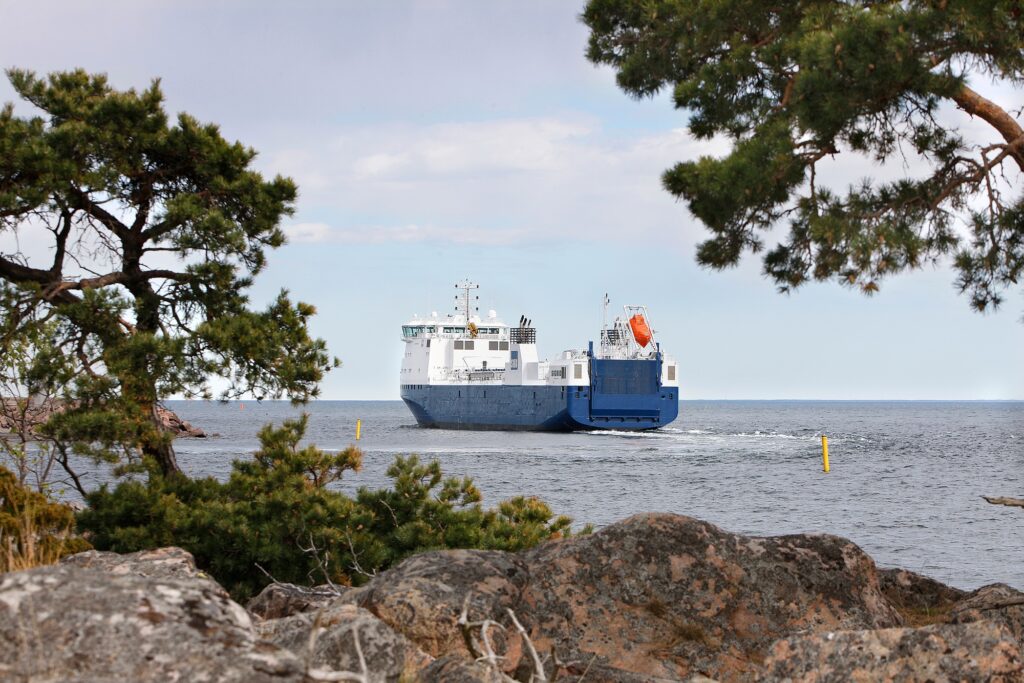This text is older than 3 years old and could contain inactive information.
Reduced carbon footprint with new fuel mix
SKB’s transport vessel m/s Sigrid will start operating with an admixture of ten percent non-fossil HVO fuel. This measure is more far-reaching than the requirements being discussed at EU level and entails a tangible reduction of SKB’s total carbon footprint.
– This is an important step in our sustainability work and something we have chosen to do despite the additional costs that the decision entails. By doing this before it becomes a requirement, and with a higher amount of HVO, we want to lead the way and try to set an example for the industry, says Ulrika Broman, Head of SKB’s Operations and Maintenance Department.
At EU level, it has been proposed that by 2025 marine fuel must consist of at least two per cent admixture of fossil-free fuel.
– We’re going even further, and expect the new fuel mix to reduce our total carbon dioxide emissions by around seven per cent, says Ulrika Broman.
HVO is an abbreviation of hydrogenated vegetable oil. It is manufactured using non-fossil raw materials such as vegetable oils or animal fats.
The transport vessel m/s Sigrid was commissioned in 2014 and already has a high environmental performance. The fuel has a low sulphur content, and thanks to a high degree of purification in catalytic converters there are also limited emissions of nitrogen oxides and particles.
Just over a year ago, SKB signed a number of promises to reduce its climate impact and to take measures to enhance biodiversity. Sustainability promises are included in Uppsala County Administrative Board’s initiative Roadmap for a Sustainable County. A number of measures have been implemented since then, including SKB replacing fossil diesel in vehicles and machines with the non-fossil fuel HVO100.
Published: 30 May 2022
News
-
Technology development and optimisation for best available technology
SKB is continuously working to develop and optimise the design of all the barriers in the final repository for spent nuclear fuel, with stringent requirements for long-term safety. The development work also involves industrialising manufacturing processes as well as construction and deposition proce…Published: 23 December 2025
-
SKB signs new agreement with South Korean repository organisation
Swedish Nuclear Fuel and Waste Management Company, SKB, through its subsidiary SKB International, has signed a new Memorandum of Understanding with its counterpart in South Korea, Korea Radioactive Waste Agency (KORAD). The agreement, which is an information exchange agreement, strengthens the relat…Published: 18 November 2025
-
SKB presents new research programme
SKB has submitted its eighteenth research programme to the Swedish Radiation Safety Authority. The report provides a comprehensive overview of progress made and outlines SKB’s future research direction. Every three years, SKB presents a Research, Development and Demonstration programme for the manag…Published: 6 October 2025
-
SKB signs collaboration agreement for the Spent Fuel Repository
SKB has signed a collaboration agreement with Implenia for the construction of the Spent Fuel Repository’s hard rock facility in Forsmark. The assignment includes access routes down to a repository level of 500 metres and the first parts of the final repository.Published: 18 June 2025
-
Drones streamline inspections and patrols at SFR
At the Final Repository for Short-Lived Radioactive Waste, SFR, in Forsmark, the maintenance team has invested in a drone to improve the work environment and streamline their work. The investment has already paid for itself during the first few months of the year through more efficient inspections a…Published: 17 June 2025
Published: 30 May 2022
